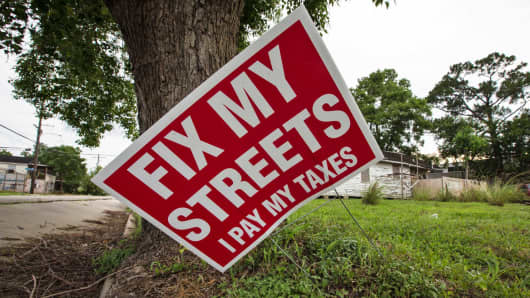For example, the tax reform bill threatens the State and Local Tax (SALT) deduction. This deduction – one of the most popular and frequently used portions of the tax code, for over one hundred years – ensures the federal government does not tax the dollars used to pay state and local taxes. Abridging it, then, would effectively force Americans to pay taxes twice on the same income. When families support their schools and police forces, they should rest assured that the federal government won't tax those dollars again.
This double taxation scheme is built entirely on Congress' failure to balance its books responsibly. It will spike annual bills in middle class households – 43 million of them, according to the Government Finance Officers Association – from coast to coast to benefit big business; Speaker Ryan and his colleagues plan to allow corporations to retain the SALT deduction, even as they remove it for everyone else. It's the kind of proposal that could only come out of a partisan process.
But the writers of the Republican tax bill don't just have it out for families living in cities and towns. This bill amounts to a full-fledged assault on those cities and towns themselves. By calling for the elimination of key bonds and tax credits, Congress seems to be insisting that local governments support important economic and social priorities entirely on their own, even as some communities continue to recover from the economic crisis or other crises like this summer's major storms.
For years, cities have used federal bonds to support projects they know will be effective. They frequently use Private Activity Bonds to fund critical infrastructure like health care facilities, airports, and affordable housing. Tax credit bonds help them renovate schools. One particularly helpful federal program allows cities to repay their debt in advance, which saves taxpayers millions every year. All of those provisions have found their way to Congress' chopping block.
We're also worried about the proposed repeal of the New Market Tax Credit, which grows urban economies and create jobs – to the tune of $75 billion in investment in underserved communities, including those represented by CBC members. The proposed repeal of the Work Opportunity Tax Credit will depress employers' efforts to hire new workers. By striking the Historic Preservation Tax Credit, we'll likely lose investments in rehabilitating historic buildings that give our cities character and honor our heritage.
It's worth mentioning how we got here. The process that created this bill was far too narrow; it seemed more designed at ensuring it received the Republican votes it needed to pass than it did at building a broad, bipartisan coalition. Half of the country – including, but not limited to, cities and communities of color – was simply left out. This brand of politics and policy will only make our country more divided.
We can think of a better way to reform our tax code. Together, let's call on Congress to slow down and get this effort right. Put the focus back on providing relief for middle class families and promoting investments in communities that have been left behind. And give Americans the tools they need to build vibrant, thriving communities.
Commentary by Mitch Landrieu, the mayor of New Orleans and the president of the U.S. Conference of Mayors and Cedric Richmond, who represents the 2nd district of Louisiana, and is the chair of the Congressional Black Caucus. Follow them on Twitter @MayorLandrieu and @RepRichmond respectively.
For more insight from CNBC contributors, follow
@CNBCopinion
on Twitter.


